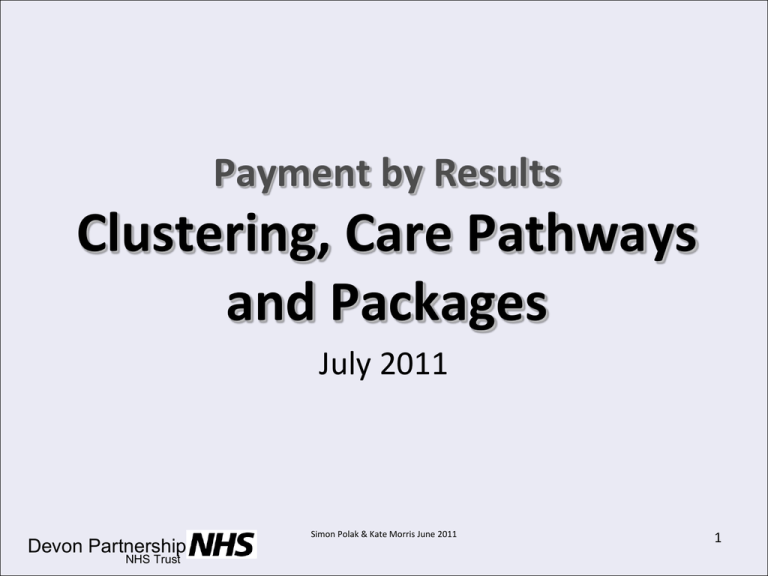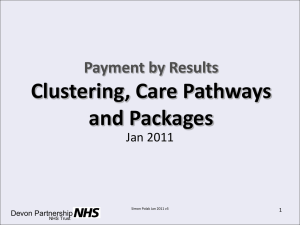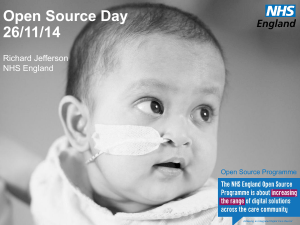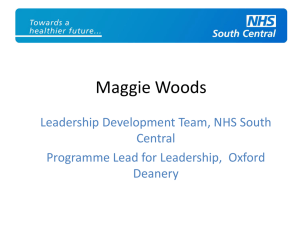Which Cluster?
advertisement

Payment by Results Clustering, Care Pathways and Packages July 2011 Devon Partnership NHS Trust Simon Polak & Kate Morris June 2011 1 Introduction and Background Mental health PbR is now coming as a radical change to funding mental health care in England. It involves clustering people based on their needs using an empirically derived process. Funding will be linked to the clusters. All teams will be clustering in the course of the next 3 months. Devon Partnership NHS Trust Simon Polak & Kate Morris June 2011 2 What is PbR? • Introduced into acute sector 2003/4 • Activity X Price = income – e.g. 10 hip replacements X £1,000 = £10,000 • But for mental health, what’s the unit of activity? – currency unit in mental health is a ‘Cluster’ • The price or tariff is yet to be set Simon Polak & Kate Morris June 2011 Devon Partnership NHS Trust 3 Clustering & Care Packages Approach • The care clusters were developed as part of the Integrated Packages Approach to Care (InPAC) programme in the Yorkshire Partnership NHS Foundation Trust and tested across 6 MH Trusts in the North East/ Yorkshire area. (Greene and Rigby, 2006) • 21 Care Clusters were derived. • Patients were assigned to the care clusters based on their presentation as assessed by the clinician and using a clustering tool based on HoNOS. • It was the ability of the InPAC cluster methodology to classify service users based on the similarity of their current needs, and to describe the similarity of their care plans(Self, et al 2008), that made care clusters attractive as a potential currency for mental health. Devon Partnership NHS Trust Simon Polak & Kate Morris June 2011 4 Payment by results PbR timescales • Clarifying the timescales in the Operating Framework 2010-11 by proposing the following: – • 2010/11 – The clusters are available for use. Reference costs are returned on a cluster basis. – • 2011/12 – • All service users accessing mental health care (post GP or other referral) that have traditionally been labelled working age (including early intervention services from age 14) and older people’s services, should be allocated to a cluster by 31 December 2011. • Local prices should be agreed for use in 2012/13 and this will require understanding of local costs per cluster. Negotiations for this start in October 2011 – DPT needs as many people clustered by then as possible. – • 2012/13 – The clusters (with local prices) become mandatory for contracting and payment purposes. – • 2013/2014 – The earliest possible date for a national tariff for mental health (if evidence from the use of a national currency presents a compelling case for a national price). Devon Partnership NHS Trust Simon Polak & Kate Morris June 2011 5 Care Clusters & Packages Clustering is a process developed to match needs to eventual evidence based care packages developed and delivered by clinical staff. This is recorded in the Clustering Assessment in RiO. Devon Partnership NHS Trust Simon Polak & Kate Morris June 2011 6 Referral The process for determining need through the allocation of a care cluster is based on the Clinical assessment. The chosen cluster then leads to an indicative care package that will be individualised to the person’s specific needs. This will be reviewed which may lead to a change of cluster and care package. Assessment Clustering Assessment (HoNOS) Review will lead to: 1. Re-clustering and the need to complete the clustering assessment and allocate a new cluster or, 2. To end a cluster because the person has been discharged or died. Cluster Care Package Review Devon Partnership NHS Trust Simon Polak Feb 2011 7 Care Clusters and Packages • Primarily clustering is based on the use of HoNOS PbR and clinical judgement • It enables us to distinguish between clinical groupings based on need as reflected in the clustering process. • The RiO forms simplify the process of capturing the results. • It enables us to develop a discreet range of evidence based interventions to meet those needs. These are the Care Packages. • The care packages will broadly indicate: – – – – The therapeutic interventions The time required based on the cluster The staff inputs The skills and knowledge base required for the intervention • The individual will require a tailored package within the broad framework. Devon Partnership NHS Trust Simon Polak & Kate Morris June 2011 8 Care Packages Care Cluster n Care Packages Evidenced based Intervention Staff Member Skills / Knowledge Devon Partnership NHS Trust Simon Polak & Kate Morris June 2011 9 Cluster Ind. Min Episode of Ind. Max. Episode Cluster Review care (wks) of care (wks) (wks) Cluster Description 1 Common mental health problems (low severity) 8 12 8 2 Common mental health problems 12 15 12 3 Non-Psychotic (Moderate Severity) 16 24 16 4 Non-Psychotic (Severe) 26 52 26 5 Non-Psychotic (Very Severe) 52 156 26 6 Non-Psychotic Disorders of over valued ideas 0 156 26 7 Enduring Non-Psychotic Disorders (High Disability) 0 156 52 8 Non-Psychotic Chaotic and Challenging Disorders 0 156 52 9 Blank Cluster 10 First Episode in Psychosis 0 156 52 11 Ongoing Recurrent Psychosis (Low Symptoms) 0 156 52 12 Ongoing or Recurrent Psychosis (High Disability) 0 156 52 13 Ongoing or Recurrent Psychosis (High Symptoms and Disability) 0 156 52 14 Psychotic Crisis 8 12 4 15 Severe Psychotic Depression 8 12 4 16 Dual Diagnosis 0 156 26 17 Psychosis and Affective Disorder Difficult to Engage 0 156 26 18 Cognitive Impairment (Low need) 0 156 26 19 Cogntive Impairment or Dementia Complicated (Moderate need) 0 156 26 20 Cognitive Impairment or Dementia Complicated (High need) 0 156 26 21 Cognitive Impairment or Dementia (High Physical or engagement needs) 0 156 26 Devon Partnership NHS Trust 10 Simon Polak Feb 2011 Clustering – when, who? • Clustering will be required – At new presentation to the service, i.e. initial assessment – At key review points including CPA review, or at the end of a defined Care Package intervention – When the person’s presentation changes significantly • Staff required to cluster: – Assessors (completing initial assessment) – Recovery Coordinators & Care Coordinators – Consultant psychiatrists • A Recovery Coordinator: – Has a defined caseload – Is responsible for directly delivering care and/or managing the gateway into care delivered by others. Devon Partnership NHS Trust Simon Polak & Kate Morris June 2011 11 Rating Bias… • Rating difference between raters – check with colleagues • Rating biased by emotional reaction of the rater – review the evidence and the rating guide • Rating biased by the assumptions made by the rater – only use the available evidence • Ratings biased by the future needs of the client – focus on this decision not the consequences • Ratings biased by misunderstanding the question – carefully review the rating guide. Devon Partnership NHS Trust Simon Polak & Kate Morris June 2011 12 Mental Health Clustering Tool Revisiting HoNOS & SARN HoNOS: In 1993 the UK Department of Health commissioned the Royal College of Psychiatrists’ Research Unit (CRU) to develop scales to measure the health and social functioning of people with severe mental illness. Development and testing over three years resulted in an instrument with 12 items measuring behaviour, impairment, symptoms and social functioning.1 The scales were developed using stringent testing for acceptability, usability, sensitivity, reliability and validity. The scales also form part of the English Minimum Data Set for Mental Health. HoNOS is the most widely used routine clinical outcome measure used by English mental health services. SARN: Summary of Assessments of Risk and Need. Was developed as part of the clinical decision support tool which underpinned the care packages and clustering work.2 1Self R; Rigby A; Leggett C and Paxton R (2008) Clinical Decision Support Tool: A rational needs-based approach to making clinical decisions. Journal of Mental Health, 17(1): 33-48. 2Wing, J. K., Curtis, R. H. & Beevor, A. S. (1999) Health of the Nation Outcome Scales (HoNOS). British Journal of Psychiatry, 174 (5), 432-434. Devon Partnership NHS Trust Simon Polak & Kate Morris June 2011 13 Care Clusters – which level? Devon Partnership NHS Trust Simon Polak & Kate Morris June 2011 14 Non-Psychotic Mild /Mid / Severe Non-Psychotic Very Severe & Complex Psychotic 1st Episode Psychotic Ongoing or recurrent Psychotic Crisis Psychotic Very Severe Engagement Organic Cognitive Impairment Devon Partnership NHS Trust 1. 2. 3. 4. 5. 6. 7. 8. 9. 10. 11. 12. 13. 14. 15. 16. 17. 18. 19. 20. 21. Common Mental Health Problems (Low Severity) Common Mental Health Problems (Low Severity with greater need) Non Psychotic (Moderate Severity) Non-psychotic (Severe) Non-psychotic Disorders (Very Severe) Non-psychotic Disorder of Over-valued Ideas Enduring Non-psychotic Disorders (High Disability) Non-Psychotic Chaotic and Challenging Disorders Blank Cluster (formally substance misuse) First Episode Psychosis Ongoing Recurrent Psychosis (Low Symptoms) Ongoing or recurrent Psychosis (High Disability) Ongoing or Recurrent Psychosis (High Symptom & Disability) Psychotic Crisis. Severe Psychotic Depression Dual Diagnosis Psychosis and Affective Disorder – Difficult to Engage Cognitive Impairment (Low Need) Cognitive Impairment or Dementia Complicated (Moderate Need) Cognitive Impairment or Dementia Complicated (High Need) Cognitive Impairment or Dementia (High Physical or Engagement) Simon Polak & Kate Morris June 2011 15 Clustering • Introduction to clustering booklet • Once scoring is complete then: – Use the decision tree to identify class – Use the cluster shapes / descriptions / diagnoses to match the cluster – Reds must match for a cluster match – Orange would be expected – Yellow may score – White unlikely to score • Review the information in the blue tabs (description, diagnosis etc). • Record the result in RiO Devon Partnership NHS Trust Clustering with RiO The following slides take you through the RiO process. The final clustering decision always lies with the clinician – RiO is designed to aid the decision HoNOS and clustering can be re-completed to reflect new information and a possible change in cluster. Devon Partnership NHS Trust Simon Polak & Kate Morris June 2011 17 Clustering – linking scores to allocation • The Clustering Assessment (HoNOS) always needs to be completed before clustering. • The Clustering Allocation needs to be linked to the completed Clustering Assessment. • This shows that the care cluster allocation was based on the scores in the Clustering Assessment completed. Devon Partnership NHS Trust Simon Polak & Kate Morris June 2011 18 The clustering assessment is found in outcome measures together with the clustering allocation screen Devon Partnership NHS Trust Simon Polak & Kate Morris June 2011 19 Assessment date in here Devon Partnership NHS Trust Search for the relevant referral here Simon Polak & Kate Morris June 2011 20 Devon Partnership NHS Trust Simon Polak & Kate Morris June 2011 21 Devon Partnership NHS Trust Simon Polak & Kate Morris June 2011 22 Link to Clustering allocation form Simon Polak & Kate Morris June 2011 Devon Partnership NHS Trust 23 Date of assessment on which the clustering is based Devon Partnership NHS Trust Simon Polak & Kate Morris June 2011 24 Devon Partnership NHS Trust Simon Polak & Kate Morris June 2011 25 Devon Partnership NHS Trust Simon Polak & Kate Morris June 2011 26 Devon Partnership NHS Trust Simon Polak & Kate Morris June 2011 27 Devon Partnership NHS Trust Simon Polak & Kate Morris June 2011 28 Useful Information • The RiO pages of the Intranet have a section on PbR and can be accessed via the link below. • http://nww.devonpartnership.nhs.uk/default. asp?a=11502&m=0 Devon Partnership NHS Trust Simon Polak & Kate Morris June 2011 29 Useful Documents (Double click to open) This booklet needs to be read and available to anyone undertaking clustering. Devon Partnership NHS Trust Simon Polak & Kate Morris June 2011 30 Further information? Contact Dpn-tr.pbr@nhs.net Devon Partnership NHS Trust Simon Polak & Kate Morris June 2011 31








